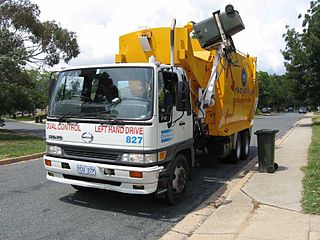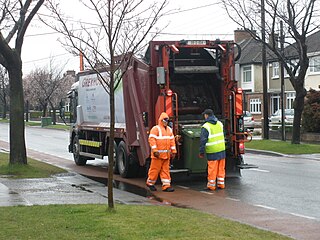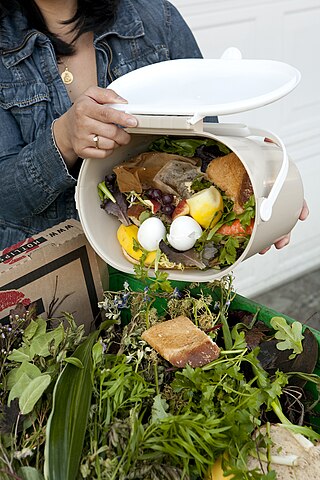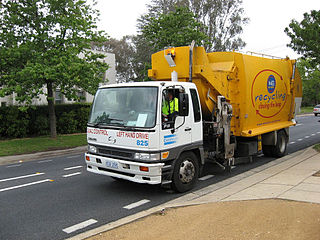
Vermicompost (vermi-compost) is the product of the decomposition process using various species of worms, usually red wigglers, white worms, and other earthworms, to create a mixture of decomposing vegetable or food waste, bedding materials, and vermicast. This process is called vermicomposting, with the rearing of worms for this purpose is called vermiculture.

Richard Michael Mayall was an English comedian, actor and writer. He formed a close partnership with Ade Edmondson while they were students at Manchester University and was a pioneer of alternative comedy in the 1980s.

Zero waste is a set of principles focused on waste prevention that encourages redesigning resource life cycles so that all products are repurposed and/or reused. The goal of the movement is to avoid sending trash to landfills, incinerators, oceans, or any other part of the environment. Currently 9% of global plastic is recycled. In a zero waste system, all materials are reused until the optimum level of consumption is reached.

Hovis Ltd is a British company that produces flour and bread. Founded in Stoke-on-Trent, it began mass-production in Macclesfield, Cheshire, in 1886. It became part of Rank Hovis McDougall (RHM) in 1962 after a succession of mergers. RHM, with its brands including Hovis and Mother's Pride, was acquired by Premier Foods in 2007.

A waste container, also known as a dustbin, garbage can, and trash can is a type of container that is usually made out of metal or plastic. The words "rubbish", "basket" and "bin" are more common in British English usage; "trash" and "can" are more common in American English usage. "Garbage" may refer to food waste specifically or to municipal solid waste in general.

Kerbside collection or curbside collection is a service provided to households, typically in urban and suburban areas, of collecting and disposing of household waste and recyclables. It is usually accomplished by personnel using specially built vehicles to pick up household waste in containers that are acceptable to, or prescribed by, the municipality and are placed on the kerb.

Green waste, also known as "biological waste", is any organic waste that can be composted. It is most usually composed of refuse from gardens such as grass clippings or leaves, and domestic or industrial kitchen wastes. Green waste does not include things such as dried leaves, pine straw, or hay. Such materials are rich in carbon and considered "brown wastes," while green wastes contain high concentrations of nitrogen. Green waste can be used to increase the efficiency of many composting operations and can be added to soil to sustain local nutrient cycling.

Biodegradable waste includes any organic matter in waste which can be broken down into carbon dioxide, water, methane, compost, humus, and simple organic molecules by micro-organisms and other living things by composting, aerobic digestion, anaerobic digestion or similar processes. It mainly includes kitchen waste, ash, soil, dung and other plant matter. In waste management, it also includes some inorganic materials which can be decomposed by bacteria. Such materials include gypsum and its products such as plasterboard and other simple sulfates which can be decomposed by sulfate reducing bacteria to yield hydrogen sulfide in anaerobic land-fill conditions.

A green bin is a large, movable, rigid plastic or metal container that contains biodegradable waste or compostable materials as a means to divert waste from landfills. In some local authorities, green bins are also used to contain unsorted municipal solid waste.

Food loss and waste is food that is not eaten. The causes of food waste or loss are numerous and occur throughout the food system, during production, processing, distribution, retail and food service sales, and consumption. Overall, about one-third of the world's food is thrown away. A 2021 meta-analysis that did not include food lost during production, by the United Nations Environment Programme found that food waste was a challenge in all countries at all levels of economic development. The analysis estimated that global food waste was 931 million tonnes of food waste across three sectors: 61 percent from households, 26 percent from food service and 13 percent from retail.

Rates of household recycling in Ireland have increased dramatically since the late 1990s. The Irish Environmental Protection Agency (EPA) is the agency with overall responsibility for environmental protection in Ireland and monitors rates of recycling in Ireland along with other measures of environmental conditions in Ireland. The EPA, along with Repak, the principal organisation for packaging recycling in Ireland, report on recycling rates each year. In 2012 Ireland’s municipal solid waste (MSW) recycling rate was 34%, while the rate of packaging recycling reached 79%. The amount of municipal waste generated per person per year in Ireland has fallen significantly in recent years. This figure remains above the European Union annual municipal waste average of 503 kg per person, however. Each local council in Ireland has considerable control over recycling, so recycling practices vary to some extent across the country. Most waste that is not recycled is disposed of in landfill sites.

In 2015, 43.5% of the United Kingdom's municipal waste was recycled, composted or broken down by anaerobic digestion. The majority of recycling undertaken in the United Kingdom is done by statutory authorities, although commercial and industrial waste is chiefly processed by private companies. Local Authorities are responsible for the collection of municipal waste and operate contracts which are usually kerbside collection schemes. The Household Waste Recycling Act 2003 required local authorities in England to provide every household with a separate collection of at least two types of recyclable materials by 2010. Recycling policy is devolved to the administrations of Scotland, Northern Ireland and Wales who set their own targets, but all statistics are reported to Eurostat.

On 1 April 2009 structural changes to local government in England took place which reformed the local government of seven non-metropolitan counties: Bedfordshire, Cheshire, Cornwall, County Durham, Shropshire, Northumberland, and Wiltshire. In each case the government of the county was changed from a two-tier to a unitary system, with Bedfordshire and Cheshire being divided into two new unitary authorities.
The California Department of Resources Recycling and Recovery is a branch of the California Environmental Protection Agency that oversees the state's waste management, recycling, and waste reduction programs. CalRecycle was established in 2010 to replace the California Integrated Waste Management Board. It is known for administering the California Redemption Value (CRV) program, among other responsibilities.

Food waste in the United Kingdom is a subject of environmental, and socioeconomic concern that has received widespread media coverage and been met with varying responses from government. Since 1915, food waste has been identified as a considerable problem and has been the subject of ongoing media attention, intensifying with the launch of the "Love Food, Hate Waste" campaign in 2007. Food waste has been discussed in newspaper articles, news reports and television programmes, which have increased awareness of it as a public issue. To tackle waste issues, encompassing food waste, the government-funded "Waste & Resources Action Programme" (WRAP) was created in 2000.

Disposable food packaging comprises disposable products often found in fast-food restaurants, take-out restaurants and catering establishments. Typical products are foam food containers, plates, bowls, cups, utensils, doilies and tray papers. These products can be made from a number of materials including plastics, paper, bioresins, wood and bamboo.

Source-separated organics (SSO) is the system by which waste generators segregate compostable materials from other waste streams at the source for separate collection.
Resource recovery is using wastes as an input material to create valuable products as new outputs. The aim is to reduce the amount of waste generated, thereby reducing the need for landfill space, and optimising the values created from waste. Resource recovery delays the need to use raw materials in the manufacturing process. Materials found in municipal solid waste, construction and demolition waste, commercial waste and industrial wastes can be used to recover resources for the manufacturing of new materials and products. Plastic, paper, aluminium, glass and metal are examples of where value can be found in waste.

It is estimated that 290 million tonnes of waste was produced in the United Kingdom in 2008 but volumes are declining. In 2012 municipal solid waste generation was almost 30 million tonnes, according to Waste Atlas Platform.

Recycling in Australia is a widespread, and comprehensive part of waste management in Australia, with 60% of all waste collected being recycled. Recycling is collected from households, commercial businesses, industries and construction. Despite its prominence, household recycling makes up only a small part (13%) of Australia's total recycling. It generally occurs through kerbside recycling collections such as the commingled recycling bin and food/garden organics recycling bin, drop-off and take-back programs, and various other schemes. Collection and management of household recycling typically falls to local councils, with private contractors collecting commercial, industrial and construction recycling. In addition to local council regulations, legislation and overarching policies are implemented and managed by the state and federal governments.
















